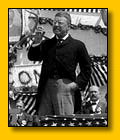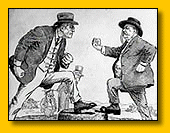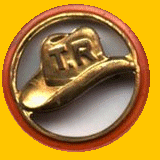Teddy Roosevelt, Progressive Party, 1912
 Theodore ("Teddy") Roosevelt became president in 1901, and was elected to a second term in 1904. At the time, he was America's youngest President, and he had a reputation as a dynamic, vigorous, and energetic executive. Years earlier, in the Spanish-American war, Roosevelt had become a national hero as he led his "Rough Riders" to victory over Cuba. He hunted game in Africa and explored South American jungles. He had also been New York's governor, New York City's police commissioner, and Vice President under William McKinley, who was assassinated one year into his second term, which is how Roosevelt, a Republican, first became President.
Theodore ("Teddy") Roosevelt became president in 1901, and was elected to a second term in 1904. At the time, he was America's youngest President, and he had a reputation as a dynamic, vigorous, and energetic executive. Years earlier, in the Spanish-American war, Roosevelt had become a national hero as he led his "Rough Riders" to victory over Cuba. He hunted game in Africa and explored South American jungles. He had also been New York's governor, New York City's police commissioner, and Vice President under William McKinley, who was assassinated one year into his second term, which is how Roosevelt, a Republican, first became President.
As President, T.R. pursued a progressive agenda, especially after his first two years in office in which he had largely adhered to McKinley's conservative doctrine. He attacked monopolistic corporations, and staked his political future on the premise that individuals - not businesses - are the key to political clout. Partially as a result of this public-oriented paradigm, T.R. introduced the concept of the "bully pulpit" and the public presidency by holding daily press briefings and going on national speaking tours to raise support for his policies.
 Roosevelt did not seek a third term as President, as per the precedent set by George Washington (which was disregarded for the first and only time by Franklin Roosevelt, Teddy's nephew), and in accordance with a promise that he had made upon his 1904 electoral stampede (his victory was the largest popular and electoral victory an incumbent had ever won). He left office in early 1909. But, Roosevelt's hand-picked predecessor, William Howard Taft, was too conservative for many Republicans' likings, despite Taft's assurances to the contrary, and so, in 1911, Senator Robert M. LaFollette and other disenfranchised Republicans established the National Republican Progressive League. The league supported LaFollette for the Republican presidential nomination until, in February 1912, Roosevelt, who was frustrated with Taft and unenthusiastic about LaFollette, announced that he would seek the Republican nomination. LaFollette's Progressive League switched its endorsement to T.R.
Roosevelt did not seek a third term as President, as per the precedent set by George Washington (which was disregarded for the first and only time by Franklin Roosevelt, Teddy's nephew), and in accordance with a promise that he had made upon his 1904 electoral stampede (his victory was the largest popular and electoral victory an incumbent had ever won). He left office in early 1909. But, Roosevelt's hand-picked predecessor, William Howard Taft, was too conservative for many Republicans' likings, despite Taft's assurances to the contrary, and so, in 1911, Senator Robert M. LaFollette and other disenfranchised Republicans established the National Republican Progressive League. The league supported LaFollette for the Republican presidential nomination until, in February 1912, Roosevelt, who was frustrated with Taft and unenthusiastic about LaFollette, announced that he would seek the Republican nomination. LaFollette's Progressive League switched its endorsement to T.R.
 Republican party leaders had different plans, though, and supported Taft's nomination at the June, 1912 party convention in Chicago. Roosevelt and his supporters refused to acquiesce, though, and decided to create an alternative: the Progressive, or Bull Moose, Party. At its own convention - two months later, in August, also in Chicago - the Progressives nominated Roosevelt as the party's candidate for President. The convention nominated Hiram W. Johnson for Vice President.
Republican party leaders had different plans, though, and supported Taft's nomination at the June, 1912 party convention in Chicago. Roosevelt and his supporters refused to acquiesce, though, and decided to create an alternative: the Progressive, or Bull Moose, Party. At its own convention - two months later, in August, also in Chicago - the Progressives nominated Roosevelt as the party's candidate for President. The convention nominated Hiram W. Johnson for Vice President.
T.R.'s charisma, which fundamentally altered the public's perception of the presidency, was a major factor in the 1912 campaign. On October 14, for example, Roosevelt was shot in the chest by a would-be assassin while speaking to a crowd in Milwaukee. Bleeding badly, Roosevelt, in typical form, continued his 90 minute speech; the event made headlines.
 The Bull Moose party platform - "New Nationalism" - included direct election of U.S. Senators, the creation of an initiative, referendum, and recall process, woman suffrage, a national tariff reduction, child labor laws, old-age pensions, and other social reforms. Roosevelt's agenda had broad support. Despite splitting the Republican vote with Taft, and therefore losing the general election to the Democratic nominee, Woodrow Wilson, T.R. received 88 electoral votes and more than four million popular votes. He soundly defeated Taft; if Taft had not run, and those who had voted for Taft then voted for T.R., Wilson probably would have lost. No third party candidate has since come close to T.R.'s success. A final indication of Roosevelt's appeal and influence is that most of his agenda became law, in several cases through a strenuous constitutional amendment process.
The Bull Moose party platform - "New Nationalism" - included direct election of U.S. Senators, the creation of an initiative, referendum, and recall process, woman suffrage, a national tariff reduction, child labor laws, old-age pensions, and other social reforms. Roosevelt's agenda had broad support. Despite splitting the Republican vote with Taft, and therefore losing the general election to the Democratic nominee, Woodrow Wilson, T.R. received 88 electoral votes and more than four million popular votes. He soundly defeated Taft; if Taft had not run, and those who had voted for Taft then voted for T.R., Wilson probably would have lost. No third party candidate has since come close to T.R.'s success. A final indication of Roosevelt's appeal and influence is that most of his agenda became law, in several cases through a strenuous constitutional amendment process.
Roosevelt's Bull Moose party existed until 1916, when he declined the party's nomination for President. Charles E. Hughes ran for President as a Republican, and attracted most of the Bull Moose supporters, effectively ending the party.
 Theodore ("Teddy") Roosevelt became president in 1901, and was elected to a second term in 1904. At the time, he was America's youngest President, and he had a reputation as a dynamic, vigorous, and energetic executive. Years earlier, in the Spanish-American war, Roosevelt had become a national hero as he led his "Rough Riders" to victory over Cuba. He hunted game in Africa and explored South American jungles. He had also been New York's governor, New York City's police commissioner, and Vice President under William McKinley, who was assassinated one year into his second term, which is how Roosevelt, a Republican, first became President.
Theodore ("Teddy") Roosevelt became president in 1901, and was elected to a second term in 1904. At the time, he was America's youngest President, and he had a reputation as a dynamic, vigorous, and energetic executive. Years earlier, in the Spanish-American war, Roosevelt had become a national hero as he led his "Rough Riders" to victory over Cuba. He hunted game in Africa and explored South American jungles. He had also been New York's governor, New York City's police commissioner, and Vice President under William McKinley, who was assassinated one year into his second term, which is how Roosevelt, a Republican, first became President.
 Roosevelt did not seek a third term as President, as per the precedent set by George Washington (which was disregarded for the first and only time by Franklin Roosevelt, Teddy's nephew), and in accordance with a promise that he had made upon his 1904 electoral stampede (his victory was the largest popular and electoral victory an incumbent had ever won). He left office in early 1909. But, Roosevelt's hand-picked predecessor, William Howard Taft, was too conservative for many Republicans' likings, despite Taft's assurances to the contrary, and so, in 1911, Senator Robert M. LaFollette and other disenfranchised Republicans established the National Republican Progressive League. The league supported LaFollette for the Republican presidential nomination until, in February 1912, Roosevelt, who was frustrated with Taft and unenthusiastic about LaFollette, announced that he would seek the Republican nomination. LaFollette's Progressive League switched its endorsement to T.R.
Roosevelt did not seek a third term as President, as per the precedent set by George Washington (which was disregarded for the first and only time by Franklin Roosevelt, Teddy's nephew), and in accordance with a promise that he had made upon his 1904 electoral stampede (his victory was the largest popular and electoral victory an incumbent had ever won). He left office in early 1909. But, Roosevelt's hand-picked predecessor, William Howard Taft, was too conservative for many Republicans' likings, despite Taft's assurances to the contrary, and so, in 1911, Senator Robert M. LaFollette and other disenfranchised Republicans established the National Republican Progressive League. The league supported LaFollette for the Republican presidential nomination until, in February 1912, Roosevelt, who was frustrated with Taft and unenthusiastic about LaFollette, announced that he would seek the Republican nomination. LaFollette's Progressive League switched its endorsement to T.R.
 Republican party leaders had different plans, though, and supported Taft's nomination at the June, 1912 party convention in Chicago. Roosevelt and his supporters refused to acquiesce, though, and decided to create an alternative: the Progressive, or Bull Moose, Party. At its own convention - two months later, in August, also in Chicago - the Progressives nominated Roosevelt as the party's candidate for President. The convention nominated Hiram W. Johnson for Vice President.
Republican party leaders had different plans, though, and supported Taft's nomination at the June, 1912 party convention in Chicago. Roosevelt and his supporters refused to acquiesce, though, and decided to create an alternative: the Progressive, or Bull Moose, Party. At its own convention - two months later, in August, also in Chicago - the Progressives nominated Roosevelt as the party's candidate for President. The convention nominated Hiram W. Johnson for Vice President.
 The Bull Moose party platform - "New Nationalism" - included direct election of U.S. Senators, the creation of an initiative, referendum, and recall process, woman suffrage, a national tariff reduction, child labor laws, old-age pensions, and other social reforms. Roosevelt's agenda had broad support. Despite splitting the Republican vote with Taft, and therefore losing the general election to the Democratic nominee, Woodrow Wilson, T.R. received 88 electoral votes and more than four million popular votes. He soundly defeated Taft; if Taft had not run, and those who had voted for Taft then voted for T.R., Wilson probably would have lost. No third party candidate has since come close to T.R.'s success. A final indication of Roosevelt's appeal and influence is that most of his agenda became law, in several cases through a strenuous constitutional amendment process.
The Bull Moose party platform - "New Nationalism" - included direct election of U.S. Senators, the creation of an initiative, referendum, and recall process, woman suffrage, a national tariff reduction, child labor laws, old-age pensions, and other social reforms. Roosevelt's agenda had broad support. Despite splitting the Republican vote with Taft, and therefore losing the general election to the Democratic nominee, Woodrow Wilson, T.R. received 88 electoral votes and more than four million popular votes. He soundly defeated Taft; if Taft had not run, and those who had voted for Taft then voted for T.R., Wilson probably would have lost. No third party candidate has since come close to T.R.'s success. A final indication of Roosevelt's appeal and influence is that most of his agenda became law, in several cases through a strenuous constitutional amendment process.